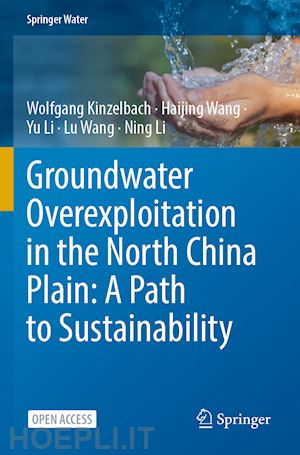
Questo prodotto usufruisce delle SPEDIZIONI GRATIS
selezionando l'opzione Corriere Veloce in fase di ordine.
Pagabile anche con Carta della cultura giovani e del merito, 18App Bonus Cultura e Carta del Docente
Over-pumping of aquifers is a worldwide problem, mainly caused by agricultural water use. Among its consequences are the falling dry of streams and wetlands, soil subsidence, die-off of phreatophytic vegetation, saline water intrusion, increased pumping cost and loss of storage needed for drought relief.
Stopping or reversing the trend requires management interventions. The North China Plain serves as an example. A management system is set up for a typical county. It contains three components: monitoring, decision support based on modelling, and implementation in the field. Besides all monitoring data, the decision support module contains an irrigation calculator, a box model, and a distributed groundwater model to project the outcomes of different water allocation scenarios. In view of grain security, a solution combines an adaptation of the cropping system with imports of surface water from the South.Prof. Dr. Kinzelbach studied Physics in Mainz and Munich Universities in Germany and Environmental Engineering at Stanford, California. He earned his Ph. D. degree in Environmental Engineering in 1978 from Karlsruhe University in Germany. After professorships in Kassel and Heidelberg, he was appointed chair of hydromechanics and groundwater at ETH Zurich. His research focused on flow and transport processes in the aquatic environment with applications in remediation, waste isolation and sustainable management. He contributed to the development of groundwater modelling, including real time modelling, and the use of remote sensing data in geohydrology. He is known world-wide for his work in the field of sustainable groundwater management. He is recipient of the Henry Darcy medal of the EGU and fellow of the AGU. Since his retirement in 2014, he has been heading the Sino-Swiss groundwater management project. He is still active as a consultant to government on nuclear waste isolation and river rehabilitation.











Il sito utilizza cookie ed altri strumenti di tracciamento che raccolgono informazioni dal dispositivo dell’utente. Oltre ai cookie tecnici ed analitici aggregati, strettamente necessari per il funzionamento di questo sito web, previo consenso dell’utente possono essere installati cookie di profilazione e marketing e cookie dei social media. Cliccando su “Accetto tutti i cookie” saranno attivate tutte le categorie di cookie. Per accettare solo deterninate categorie di cookie, cliccare invece su “Impostazioni cookie”. Chiudendo il banner o continuando a navigare saranno installati solo cookie tecnici. Per maggiori dettagli, consultare la Cookie Policy.